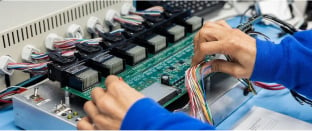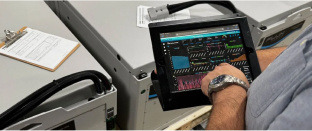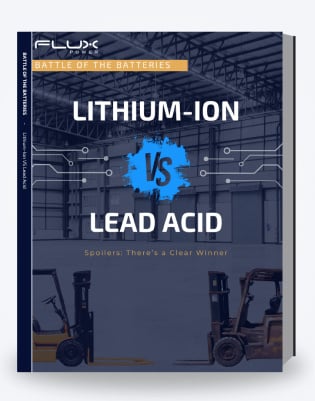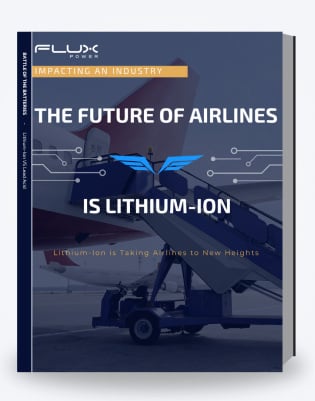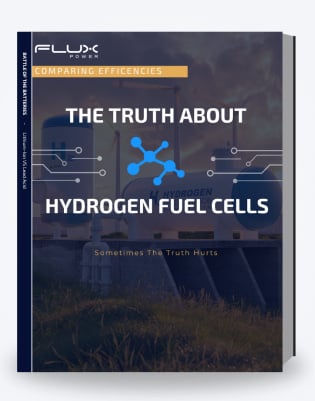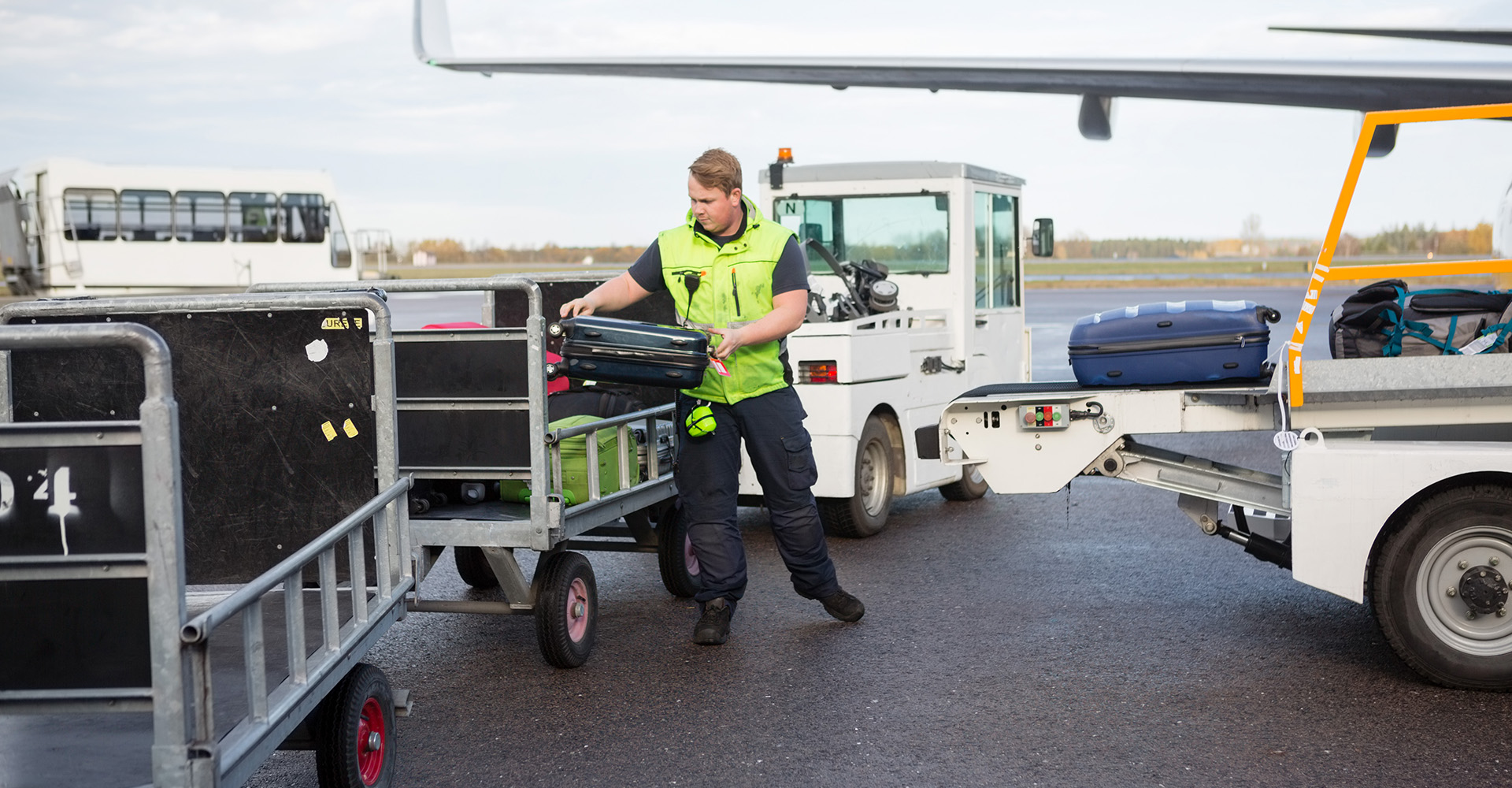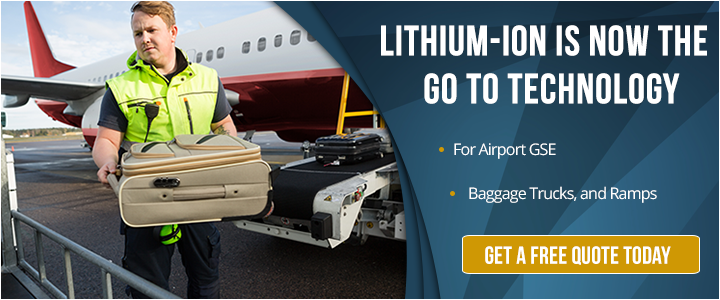As airline travel continues to be at an all-time high, carrying 1 billion passengers in 2018, the need to have reliable and efficient airport ground support equipment (GSE) is critical.
Although many airports still use internal combustion GSE, they are starting to move toward electric GSE. You can read more in our article, The Move To Make Airport Baggage Trucks More Efficient.
Electric GSE has revolutionized the way airport ground operations function, offering cleaner technology while improving efficiency and long-term costs.
Today’s electric GSE is typically powered by lead acid batteries.
Yet, despite the use of lead acid batteries, lithium-ion technology is quickly becoming the battery of choice for GSE operators. Here are some of the reasons why operators prefer lithium-ion batteries to power their ground support equipment.
Faster Charge
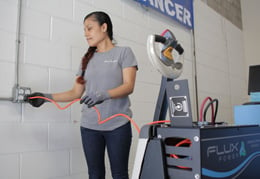 Most large airports, and some medium sized airports, feature passenger and cargo flights arriving and departing throughout a 24-hour period.
Most large airports, and some medium sized airports, feature passenger and cargo flights arriving and departing throughout a 24-hour period.
And, even when flights are not landing or taking off from an airport, ground support crews are working around the clock to perform routine maintenance, load cargo, empty and refill lavatories and tow planes to hangars for repairs.
At many of these airports, aircraft ground support equipment must be available 24/7 to meet the needs of a fast-paced environment with little downtime.
Therefore, using a battery with a remarkably fast charging time helps ensure productivity is maximized no matter what time of day.
Unlike lead acid batteries, lithium-ion batteries can be opportunity charged throughout the day or evening because they take just 1 to 2 hours to charge. Lithium-ion batteries can also be partially charged without damaging the battery.
This is important as well because lithium-ion batteries typically run about 7.2 hours before they need to be charged, whereas lead acid batteries require charging after about 5.4 hours of use. A lead acid battery cannot be opportunity charged. It must go out of service for about 8 hours for charging and another 8 hours for cooling down.
Better Performance And Energy Efficiency
Lithium-ion batteries maintain a constant voltage throughout the discharge cycle. That means ground support equipment will not experience a performance decrease as the battery discharges.
Lithium-ion batteries can be as much as 50% more energy efficient compared to lead acid batteries as well.
Because lithium-ion batteries can be safely discharged down to 20% capacity (compared to 30% for lead acid), ground support equipment operators will see longer periods of use at high levels of efficiency.
Improved Performance In Cold Weather
For ground support equipment operators who work in cold climates, being able to rely on a battery that will perform in challenging conditions is important.
Lithium-ion batteries only experience a 10% drop in capacity in colder temperatures. Lead acid batteries can experience a significantly worse reduction in capacity when used in cold climates.
Ground support equipment operators can benefit as well from batteries that have a battery management system with a heater. This keeps cell temperatures in their ideal range.
Enhanced Safety
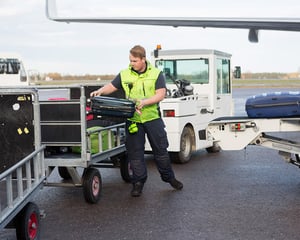 Airport ground crews face safety hazards on a daily basis, from physical injuries to toxic fumes and chemicals.
Airport ground crews face safety hazards on a daily basis, from physical injuries to toxic fumes and chemicals.
The use of lithium-ion batteries to power ground support equipment offers a safer work environment in several ways.
A Cleaner Choice
Lithium-ion batteries are one of the cleanest choices for powering equipment at airports. Unlike internal combustion engine GSE, lithium-ion batteries produce zero carbon emissions and no fumes when charging.
In contrast, ground support vehicles that run on diesel or gasoline produce high levels of carbon emissions and pollutants that crews are then exposed to. Even lead acid batteries in electric GSE can produce noxious fumes when charging.
A Minimal Risk Of Overheating
Lithium-ion batteries include a battery management system that tracks cell temperatures. This ensures temperatures remain in safe operating ranges, preserving the battery and protecting employees.
If a lead acid battery overcharges, electrolyte solution inside can overheat, increasing pressure inside the battery. This can cause damage to the battery, or worse, a dangerous explosion that can threaten the safety of workers.
No Water Maintenance
Lithium-ion batteries are sealed shut and do not require water maintenance. Lead acid batteries, on the other hand, require regular water maintenance. This process of refilling the battery with water comes with risks, however. If a spill occurs, highly-toxic sulfuric acid inside the battery can splash onto a crew member’s body and cause serious harm.
Lower Risk Of Physical Injury
Lithium-ion batteries can stay inside ground support equipment for the charging process. This reduces the risk of any injuries occurring since battery swapping is not required.
Each time a lead acid battery requires charging, crews must remove the battery using another piece of equipment such as a forklift and transfer it to a dedicated charging room. Crew members may be able to remove smaller batteries themselves without the assistance of a forklift.
Battery Of Choice
Electric GSE provides a cleaner option for ground support crews. However, between the two power sources for GSE, lithium-ion is the one choice that can further increase productivity, performance and safety.
Lithium-ion batteries have had a significant impact for airports, making them the up and coming battery of choice for ground support equipment operators throughout the world.

